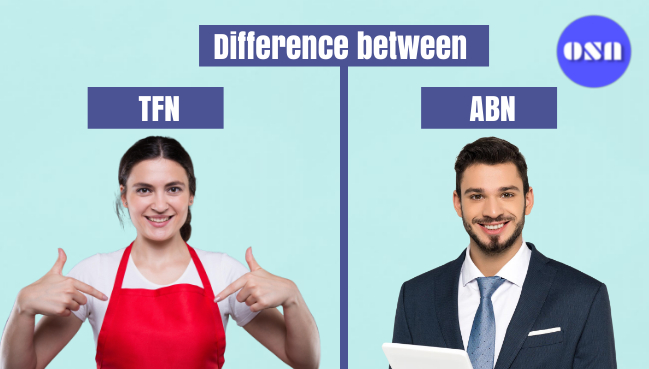Difference explained: ABN vs TFN

If you are planning to work in Australia, you will need either a TFN or an ABN or maybe both.
As an international student, it is very important to understand the difference when working with TFN and ABN.
In this article, we are going to be discussing the difference between ABN vs TFN.
What is TFN?
“TFN” stands for Tax File Number. It is a 9-digit number that identifies you as an employee and a taxpayer in Australia.
Anyone who wants to work in Australia will need to have a TFN. It is a unique number for everyone, and you only get it once in your lifetime.
Learn how to apply for your TFN here
What is an ABN?
“ABN” is an abbreviation for “Australian Business Number.” It is an 11-digit number that identifies you as a business in Australia.
Every business operating in Australia must have an ABN. You can work as a sole trader using ABN as well.
Learn how to apply for your ABN here:
ABN vs TFN
1. Employment Status
When you are working with TFN, you’d have to sign a contract that signifies you as an employee of the business.
If you are operating under an ABN, either as a contractor, freelancer, self-employed, or gig-economy worker, you will be considered a self-employed business in Australia.
2. Pay
With TFN, the employer pays you salary or wages every week or every fortnight, which usually goes directly into your bank account.
As an ABN holder, you don’t get paid a salary or wages. You will have to create your own invoice and send it to the business, and they will pay your invoice.
With an ABN, you get paid based on the contract of agreement you have with the business.
3. Taxes
When working under TFN, your employer deducts taxes from your salary before it gets paid into your bank account.
And at the end of the financial year, you receive a payment summary in MyGov that includes the amount of money the employer paid you during the financial year and the amount of taxes deducted from your salary.
This information in MyGov will help you with your tax return. Here’s a tax return guide for international students in Australia:
For ABN holders, the businesses you work with will pay you the invoice in full. They don’t deduct any taxes from that, and if your business is registered for GST, you will have to charge that to your customers.
So, you are required to pay and manage your own taxes when working with an ABN.
4. Superannuation
When you are working under TFN, your employer is responsible for paying you superannuation, which is added to your wages and salary.
At the moment, it is 10.5% of your salary and that goes directly into your superannuation fund account.
If you are working with ABN, you do not get any superannuation paid by the businesses you work with. However, as an ABN holder, you can contribute money to your own superannuation.
5. Insurance
If you are working under a TFN arrangement, your employer will cover you for work cover and personal indemnity insurance.
They have to pay an insurance premium for having you work with them. It is to make sure that you are covered for any accident or any other personal indemnity issues that might occur at the workplace.
However, with an ABN, you are responsible for getting your own insurance, whether it is work cover insurance, or personal indemnity insurance or any other relevant insurance..
6. Leave
If you are working as a casual employee, there is no leave entitlement for you, which means there is no annual leave or sick leave. But if you are working on a part-time or full-time basis, you are entitled to annual and sick leave.
If you are working with an ABN, you are your own boss, so there are no holiday entitlements for you.
Can you work with ABN and TFN at the same time?
One of the very common questions among international students is, Can I work on both ABN and TFN at the same time?
The answer is Yes!
Let’s explain that using this example:
James, an international student, came to Australia with a student visa and got a part-time job in a local restaurant as a kitchen hand.
Due to the restrictions on his visa, he got 40 hours per fortnight and he and his boss signed a contract.
Now he works as an employee with TFN, and he gets paid based on the hours he works.
His boss has to deduct taxes from his salary, pay him superannuation, and give him annual leave or sick leave, insurance, and other entitlements as well.
Now let’s say due to the pandemic, James lost a few work hours in the restaurant, so he decided to become an Uber Eats delivery person.
When doing Uber Eats, he is not an employee of Uber Eats, but rather you work as a delivery partner with them.
So basically, he is running his own business as he chooses his own work hours and does deliveries when it suits him.
James is now working part-time with a restaurant, and he is self-employed as a partner with Uber Eats.
There is no superannuation paid by Uber Eats and there are no taxes deducted from his payments. He also doesn’t have any leave entitlements or insurances either.
He can work on both ABN and TFN at the same time, but no more than hours allowed on his student visa.
Sham Contracting
It is very important to understand the difference between working with an ABN or TFN because some employers may ask you to get an ABN when you should be working as an employee on a TFN.
That is known as Sham contracting.
A Sham contract is when an employee tries to disguise an employment relationship as an independent contracting arrangement.
Some employers try to do that so that they won’t have to worry about your taxes, superannuation, insurance, annual or sick leave, and other entitlements.
To find out more about your work rights in Australia, you can visit the Fair Work Australia website.
We also have a detailed article on how to avoid exploitation at work in Australia, you can read it here.


